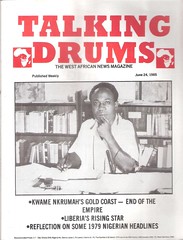Comment
Lest We Forget
American television kept recalling the Iranian hostage crisis, the unmerciful criticisms made by the then candidate Reagan of what he saw as the indecisive President Carter and the newly inaugurated President Reagan's pledge of swift retribution against terrorists if they should dare attack Americans.
Things must be looking somewhat different to President Reagan now that he is in his own hostage crisis and the frustrations of the limitations of power are becoming clearer.
For all our professed claim to worshipping the past when it gets to events that are unpleasant or that go against the current grain, we Africans display an amazing capacity for deliberate amnesia,
Flight-Lieutenant Rawlings of Ghana probably recalls the scorn he used to heap on "leaders, so-called, who are growing fat in the midst of all our problems", as he himself manages to put on weight in the midst of all Ghana's problems. However, any attempt to recall his words then is regarded as subversive.
At one time the triumphant Sergeant Gnassingbe Eyadema (as he then was) boasted openly that he killed the Togolese leader Sylvanus Olympio. Today it does not suit his image and he has been doing some fanciful juggling of words to rewrite history. Preferably, he would rather everybody forget the whole affair and pretend it never happened. And his strongly controlled Togolese press encourages the wholesale amnesia.
In much the same way the Liberian leader does not want to be reminded of the days when he was a very lean and angry/hungry looking Master Sergeant. Even the words he spoke then captured as they were on tape and film by many, he has tried to disown, claiming they were really the words of his advisers then. The official line is to pretend that certain events never happened.
The year 1979 does not belong in the too distant past, the events that took place then do not belong in the realms of things that can only be recollected and told by griots and thus we at Talking Drums have been reading Nigerian newspapers of 1979. And they have proved very fascinating. At that time in the first few months of the new civilian regime, the news items all had a most familiar ring. Fraudulent contracts, kickbacks, empty treasuries, irresponsible government officials and much more.
The only surprise is that the villains of the piece then were the members of the outgoing military government who had handed over power or were in the process of handing over to the elected government.
The news items make very strange reading today considering that the knights in shining armour who have come to save Nigeria from supposedly "corrupt politicians", were in 1979 openly accused of the very same things that they are accusing the politicians today.
There is no question but that if the politicians as a group had accepted ex-President Shehu Shagari's observation then that there existed in Africa only two main parties - the military and the civilians - and if there had been the political will, there would have been many trials for fraud and corruption. And many people who have re-emerged as saints today would have been disgraced.
Of particular interest are the identities of the people who were loud in their condemnations of the outgoing military government. It is a strange coincidence that they were the first politicians to have tasted the wrath of the current military tribunals and have generally got the longest sentences.
Cynics might see some correlation between the present plight of the former Lagos state Governor, Lateef Jakande (still in jail, no charges 18 months after the coup), and the fact that he was one of the brave politicians who exposed the profligacy of the military administration that had preceded him.
If one wanted to see such parallels, former Governor Onabanjo would seem to fall in the same category. It might also be better understood why the former governor of Kano State, Alhaji Bakin Zuwo, has had the harshest sentences and had the more dramatic appearances of the Tribunals, if one reads the newspaper publications that he was the first person to have brought into the open what came to be known as the N2.8 billion oil scandal.
When Major-General Muhammadu Buhari spoke to the Nigerian nation in January 1984 he stated that his was an off-shoot (a continuation) of the Murtala/Obasanjo administrations. It would not be a case of mischief if he is reminded of the time that that administration was portrayed to the public as corrupt, profligate and irresponsible.
Our people never embark upon anything without invoking the presence of their ancestors. 1979 has not yet been consigned to the custody of our ancestors and to pretend that these matters did not exist is only to ensure that they occur over and over again. Bringing up pertinent matters of the past is frowned upon, with everybody pretending they never happened. This self- induced amnesia has made our leaders come to believe in the present auras they have cocooned themselves in.
The distant past also becomes nostalgia and simply entertaining as most of the participants are usually either dead or no longer in positions of power and there is no danger of annoying anybody.
By publishing clips from the immediate past, we intend and hope to make people remember.
